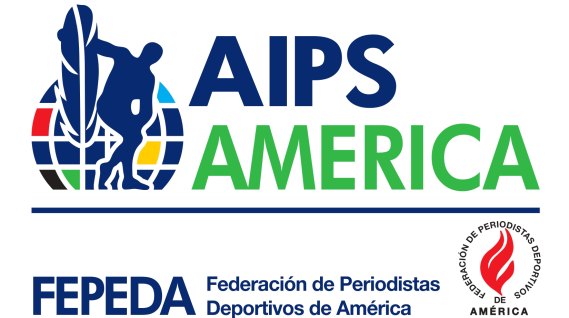Por Gianni Merlo – Presidente de AIPS
Traducido por Constanza Mora Pedraza – Miembro Aips
TOKIO, Japón, 17 de julio de 2021.- Si bien los periodistas, al menos los que llegamos en los últimos 14 días, vivimos en un ambiente de prueba, porque solo podemos ir del hotel al Centro Principal de Prensa o a las instalaciones deportivas consideradas dentro de nuestra burbuja protegida, afuera, el aumento de casos positivos de Covid-19 en Tokio está poniendo al Gobierno cada vez en más dificultades. La situación es más tensa y existe una gran preocupación por las posibles reacciones del público. Aquí en Japón 1.500 casos representan un umbral de peligro grave, mientras que estamos acostumbrados a estas cifras, lo que nos deja casi indiferentes.

En Italia, hemos subido a más de 2.000 casos y la tendencia de crecimiento nos dice que para la próxima semana los «números» de Covid-19 volarán como lo hicieron hace unos meses, también gracias al efecto de la «Alegría por la victoria en Londres en la final del Campeonato de Europa de fútbol contra Inglaterra ”. Si vamos al Reino Unido subimos a 50.000 y todo está abierto.
Periodistas Preocupados- Aún no se ha anunciado el número de periodistas a los que se les permitirá el acceso a las instalaciones donde se llevarán a cabo las competencias olímpicas. El sistema de reserva adoptado por los organizadores es un poco desconcertante porque le da al administrador del lugar el poder de determinar quién será admitido y quién no. Desafortunadamente, algunos administradores de escenarios no tienen experiencia y, por lo tanto, les resultará difícil llevar a cabo esta tarea. Se buscan soluciones para evitar inconsistencias.
Atleta desaparecido- La noticia de que un atleta de Uganda, el levantador de pesas de 20 años Julius Ssekitoleko, abandonó el distrito de entrenamiento en Izumisano, cerca de Osaka, y se perdió, ha aumentado la controversia. El atleta dejó una nota que dice: «Quiero trabajar en Japón», dijeron el viernes funcionarios locales. La policía ahora está realizando una búsqueda en un caso que puede generar más preguntas sobre la seguridad de los juegos que se llevarán a cabo en medio de la pandemia del coronavirus. El equipo de Uganda, que aterrizó en Japón el 16 de junio, tuvo dos atletas positivos, quienes se pusieron en estricta cuarentena junto a los demás del grupo. Entonces todo pareció volver a la normalidad. Ssekitoleko desapareció antes de ser sometido a la prueba de PCR anti-Covid. Los funcionarios ugandeses dicen que su deserción no se debe al temor de ser confinado en cuarentena porque tiene fiebre, sino porque le dijeron que no competiría. El atleta, que pertenece a la categoría de 67 kg, debía regresar a Kampala la próxima semana. Lamentablemente, las delegaciones deportivas de Uganda tienen muchos precedentes de este tipo, deportistas que se han esfumado en el aire. Pero esta vez a la policía de Osaka le preocupa que Ssekitoleko pueda estar infectado, pero sin síntomas, y desencadene un brote de Covid.
Vuelos restringidos- El gobierno japonés ha decidido pedir a las aerolíneas que no acepten nuevas reservas hasta el final de los Juegos, porque quiere limitar las llegadas ajenas a los Juegos Olímpicos a unos 2.000 pasajeros por día en los cinco aeropuertos de Narita y Haneda, cerca de Tokio, Osaka. , Chūbu y Fukuoka, para poder realizar las pruebas anti-Covid de la mejor manera. Además, el gobierno pidió a las empresas extranjeras que limiten las reservas a un máximo de 40 pasajeros, que no estén en tránsito ni llegando para los Juegos Olímpicos. Se ha establecido un máximo de 3.400 pasajeros por semana para las empresas japonesas. Se trata de fuertes restricciones no solo económicas, sino que el Ministerio de Salud teme que no podrá seguir el ritmo de las pruebas realizadas hasta ahora.
ENGLISH
Increasingly tense Japan limits number of arrivals to control coronavirus spike
By Gianni Merlo – AIPS President
Translated by: Constanza Mora Pedraza – Aips Member
TOKYO, July 17, 2021 – While we journalists, at least we who arrived within the past 14 days, live in an atmosphere of probation, because we can only go from the hotel to the Main Press Centre or to the sports facilities considered within our protected bubble. Outside the increase in positive cases of Covid-19 in Tokyo is putting the Government in more and more difficulties. The situation is increasingly tense and there is huge worry about the possible reactions from the public. Here in Japan 1,500 cases represent a serious danger threshold, while we are accustomed to these figures, which leaves us almost indifferent.
In Italy, we have risen to over 2,000 cases and the growth trend tells us that by next week the Covid-19 «quotations» will fly as they did a few months ago, also thanks to the effect of the «Joy for the victory in London in the final of the European Championships of football against England.» If we go to the UK we go up to 50.000 and everything is open.
Concerned journalists- The number of journalists who will be granted entry to the facilities where the Olympic competitions will be held has not yet been announced. The booking system adopted by the organizers is a little perplexing because it gives the venue manager the power to determine who will be admitted and who will not. Unfortunately, some venue managers have no previous experience and therefore will find it difficult to carry out this task. Solutions are being sought to avoid inconsistencies.
Athlete disappeared- The news that a Ugandan athlete, 20-year-old weightlifter Julius Ssekitoleko, has moved away from the training district in Izumisano, near Osaka and lost his tracks, has added fuel to the controversy. The athlete left a note to the effect of, “I want to work in Japan,” local officials said Friday, with police now conducting a search in a case that may raise further questions about the safety of the games to be held amid the coronavirus pandemic. The Ugandan team, which landed in Japan on June 16, had suffered two positive athletes, who had been placed in strict quarantine like the others in the group. Then everything seemed to have returned to normal. Ssekitoleko vanished before being subjected to the anti-Covid PCR test. Ugandan officials say his defection is not due to fear of being confined to quarantine because he is feverish, but because he was told that he would not compete. The athlete, who belongs to the 67 kg category, was due to return to Kampala next week. Unfortunately, the Ugandan sports delegations have many precedents of this type, athletes who have vanished into thin air. But this time the Osaka prefecture police are worried that Ssekitoleko could be infected, but without symptoms, and trigger a Covid outbreak.
Restricted flights- The Japanese government has decided to ask airlines not to accept new bookings until the end of the Games, because it wants to limit non-Olympics arrivals to around 2,000 passengers per day at the five Narita and Haneda airports, near Tokyo, Osaka, Chūbu and Fukuoka, so as to be able to carry out anti-Covid tests in the best way. Also the government called on foreign companies to limit the booking to a maximum of 40 passengers, who are not in transit or arriving for the Olympics. A maximum of 3,400 passengers per week has been established for Japanese companies. These are heavy restrictions not only economically, but the health ministry fears it will not be able to keep up with the pace of tests carried out so far.



